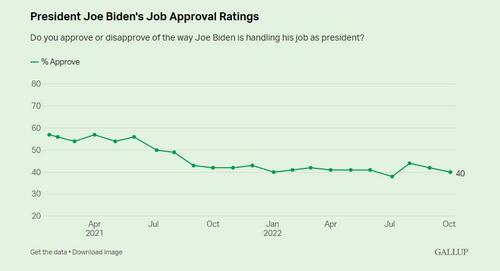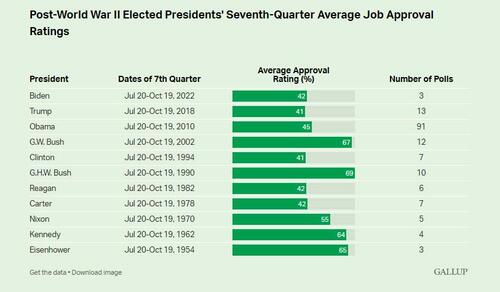
By Jeffrey Jones of Gallup
Joe Biden's job approval rating is 40%, a step down from the 44% measured in August but still above his term-low 38% from July. In all other months in 2022, his approval rating has been in the 40% to 42% range.
The Oct. 3-20 survey finds 56% of Americans disapproving of Biden's performance, unchanged from September and midway between his highest (59% in July) and lowest (53% in August) disapproval scores this year.
Biden's approval ratings continue to be starkly different by political party, with 85% of Democrats and 4% of Republicans approving. The 81-point gap in party ratings matches the average for Biden's presidency to date, and is the same level of polarization measured in Donald Trump's job approval ratings, on average.
Thirty-nine percent of political independents approve of the job Biden is doing, which is slightly above the 36% average approval rating among independents from January to September.
Biden Seventh-Quarter Approval Average Fairly Typical
Biden averaged a 42% job approval rating during his seventh quarter in office, which spanned July 20 through Oct. 19. That average is similar to what most other elected presidents dating back to Jimmy Carter received during their seventh quarters in office. The major exceptions were George H.W. Bush and George W. Bush, who had significantly higher ratings tied to the U.S. response to Iraq's invasion of Kuwait and the 9/11 terrorist attacks, respectively.
Carter, Ronald Reagan, Bill Clinton and Trump all averaged 41% or 42% approval during their seventh quarter, while Barack Obama's 45% average during that time was slightly higher.
Biden's seventh quarter was notable for the ongoing high inflation and elevated gas prices the country was experiencing. Gas prices have come down from their mid-June high but remain above where they were a year ago. A bright spot for the economy is the continued strong job market, with the unemployment rate matching its lowest point since 1969.
Additionally during his seventh quarter, Biden achieved key campaign goals with passage of the Inflation Reduction Act, which addresses climate change, prescription drug costs and deficit reduction. Biden also announced a plan, now on hold pending litigation, to forgive student loan debt for many U.S. adults holding such loans.
Bottom Line
Americans' evaluations of the job Biden is doing as president continue to be more negative than positive, as they have for over a year now. Given the relationship between low job approval ratings and midterm election outcomes, Biden's unpopularity is likely to be a drag on his fellow Democrats' chances in this fall's voting.
By Jeffrey Jones of Gallup
Joe Biden’s job approval rating is 40%, a step down from the 44% measured in August but still above his term-low 38% from July. In all other months in 2022, his approval rating has been in the 40% to 42% range.
The Oct. 3-20 survey finds 56% of Americans disapproving of Biden’s performance, unchanged from September and midway between his highest (59% in July) and lowest (53% in August) disapproval scores this year.
Biden’s approval ratings continue to be starkly different by political party, with 85% of Democrats and 4% of Republicans approving. The 81-point gap in party ratings matches the average for Biden’s presidency to date, and is the same level of polarization measured in Donald Trump’s job approval ratings, on average.
Thirty-nine percent of political independents approve of the job Biden is doing, which is slightly above the 36% average approval rating among independents from January to September.
Biden Seventh-Quarter Approval Average Fairly Typical
Biden averaged a 42% job approval rating during his seventh quarter in office, which spanned July 20 through Oct. 19. That average is similar to what most other elected presidents dating back to Jimmy Carter received during their seventh quarters in office. The major exceptions were George H.W. Bush and George W. Bush, who had significantly higher ratings tied to the U.S. response to Iraq’s invasion of Kuwait and the 9/11 terrorist attacks, respectively.
Carter, Ronald Reagan, Bill Clinton and Trump all averaged 41% or 42% approval during their seventh quarter, while Barack Obama’s 45% average during that time was slightly higher.
Biden’s seventh quarter was notable for the ongoing high inflation and elevated gas prices the country was experiencing. Gas prices have come down from their mid-June high but remain above where they were a year ago. A bright spot for the economy is the continued strong job market, with the unemployment rate matching its lowest point since 1969.
Additionally during his seventh quarter, Biden achieved key campaign goals with passage of the Inflation Reduction Act, which addresses climate change, prescription drug costs and deficit reduction. Biden also announced a plan, now on hold pending litigation, to forgive student loan debt for many U.S. adults holding such loans.
Bottom Line
Americans’ evaluations of the job Biden is doing as president continue to be more negative than positive, as they have for over a year now. Given the relationship between low job approval ratings and midterm election outcomes, Biden’s unpopularity is likely to be a drag on his fellow Democrats’ chances in this fall’s voting.







